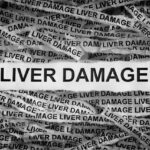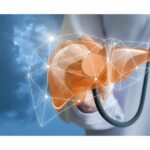Are you worried about the health of your liver? Keep an eye out for these five warning signs of alcohol-related liver damage.
If you experience abdominal pain, jaundice, fatigue, swelling in your legs, or easy bruising, it might be time to make some changes.
This informative article will help you understand the signs and symptoms to watch for, allowing you to take action and protect your liver health.
Abdominal Pain and Discomfort
If you experience persistent abdominal pain and discomfort after drinking alcohol, it's important to seek medical attention as it may be a warning sign of alcohol-related liver damage. Digestive issues, such as abdominal pain and discomfort, are common symptoms of liver damage caused by excessive alcohol consumption. The liver plays a crucial role in the digestion process, producing bile and enzymes that help break down fats and absorb nutrients. When the liver is damaged, it can lead to a variety of digestive problems, including abdominal pain and discomfort.
Alcohol-related liver damage occurs when the liver is unable to efficiently process and eliminate alcohol from the body. This can result in inflammation and scarring of the liver, leading to digestive issues and other complications. One important indicator of liver damage is an increase in liver enzymes, which are substances produced by the liver to aid in its normal functioning. When the liver is damaged, these enzymes may leak into the bloodstream, causing abdominal pain and discomfort.
If you're experiencing persistent abdominal pain after drinking alcohol, it's crucial to consult a healthcare professional. They can evaluate your symptoms, perform tests to measure liver enzymes, and provide appropriate treatment options. Remember, early detection and intervention can help prevent further damage and improve your overall digestive health.
Jaundice and Yellowing of the Skin
Persistent abdominal pain and discomfort after drinking alcohol can be accompanied by another warning sign of alcohol-related liver damage: jaundice and yellowing of the skin. Jaundice occurs when the liver is unable to effectively process bilirubin, a yellow pigment produced during the breakdown of red blood cells. When liver function is compromised due to excessive alcohol consumption, bilirubin builds up in the body, leading to the characteristic yellowing of the skin and eyes.
Jaundice is a clear indication of liver damage and shouldn't be ignored. It's important to seek medical attention if you notice any yellow discoloration of the skin or eyes. A healthcare professional can perform tests to assess your liver function and determine the underlying cause of the jaundice.
If alcohol-related liver damage is diagnosed, treatment options may include lifestyle changes such as quitting alcohol consumption, adopting a healthy diet, and exercising regularly. Additionally, medications may be prescribed to support liver function and manage symptoms. In severe cases, a liver transplant may be necessary.
Remember that jaundice is a serious symptom of alcohol-related liver damage and shouldn't be taken lightly. Seeking prompt medical attention and making necessary lifestyle changes can help prevent further liver damage and improve overall health.
Fatigue and Weakness
When experiencing alcohol-related liver damage, you may notice a significant decrease in energy levels and overall physical strength. Fatigue and weakness are common symptoms that indicate the impact of alcohol on your liver.
Your liver plays a crucial role in metabolizing alcohol, but excessive drinking can lead to inflammation and damage to liver cells. This damage can result in muscle fatigue and weakness, making even simple tasks feel exhausting.
The liver is responsible for converting glucose into glycogen, which is stored and used as energy when needed. However, alcohol impairs this process, leading to decreased energy levels and a feeling of constant tiredness.
Moreover, alcohol-related liver damage can also cause cognitive impairment, affecting your ability to think clearly and make decisions. This cognitive decline can further contribute to your overall sense of fatigue and weakness.
If you're experiencing these symptoms, it's important to seek medical attention as soon as possible to prevent further damage and manage your condition effectively.
Swelling in the Legs and Ankles
One common symptom of alcohol-related liver damage is swelling in the legs and ankles, as a result of fluid retention. When the liver is damaged, it can no longer function properly to filter and remove toxins from the body. As a result, fluid can accumulate in different parts of the body, including the legs and ankles.
Fluid retention, also known as edema, is a common symptom of liver cirrhosis, which is the advanced stage of alcohol-related liver damage. When the liver becomes scarred and hardened due to excessive alcohol consumption, it hampers the flow of blood through the liver. This leads to an increase in pressure in the veins that carry blood from the intestines and other organs to the liver, causing fluid to leak out into the surrounding tissues.
Swelling in the legs and ankles may occur gradually and worsen over time. It's often accompanied by other symptoms such as fatigue, abdominal pain, and yellowing of the skin and eyes. If you notice persistent swelling in your legs and ankles, it's important to seek medical attention as it may indicate liver damage or other underlying health issues.
Your doctor can perform necessary tests to diagnose the cause of the swelling and recommend appropriate treatment options.
Easy Bruising and Bleeding
If you experience easy bruising and bleeding, it may be a warning sign of alcohol-related liver damage. The liver plays a crucial role in blood clotting, so when it becomes damaged due to excessive alcohol consumption, it can affect the body's ability to stop bleeding and lead to easy bruising. Alcohol-related liver damage can cause a decrease in platelet count, which are cells responsible for blood clotting. Additionally, it can impair the production of clotting proteins in the liver, further contributing to bleeding issues.
Alcohol-related liver damage can also lead to the formation of spider angiomas, which are small blood vessels that appear close to the skin's surface. These spider-like veins are fragile and can easily break, causing bleeding. Furthermore, alcohol can weaken the blood vessels themselves, making them more prone to rupture and resulting in bruising.
It is important to note that easy bruising and bleeding may not only be caused by alcohol-related liver damage, but it can be a significant indicator of liver health. If you're experiencing these symptoms, it's crucial to consult with a healthcare professional who can evaluate your liver function and provide appropriate guidance and treatment.
- Overcoming Emotional Intimacy Challenges With Alcohol Misuse - November 18, 2023
- Overcoming Alcohol's Impact on Emotional Intimacy: 13 Essential Tips - November 18, 2023
- 6 Ways to Overcome Emotional Intimacy Challenges With Alcohol - November 18, 2023










